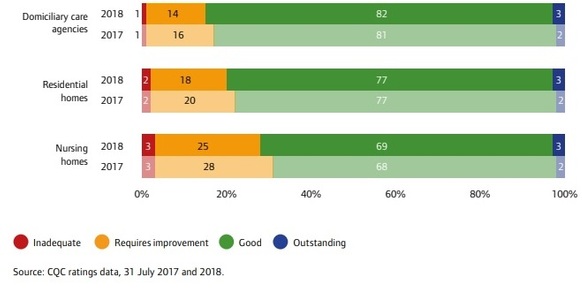'Superhuman efforts' by care providers sees majority give 'good' care
A decline in the number of care homes has not stopped the majority of care services in England getting a ‘good’ or ‘outstanding’ rating from inspectors - a result linked to ‘superhuman efforts’ by care providers.

More than four fifths of care services this year were rated either ‘outstanding’ - three per cent (up from two per cent ) or ’good’ - 79 per cent (up from 78 per cent).
According to the Care Quality Commission's (CQC) annual State of Care report ‘most people in England receive a good quality of care’ with quality improved when compared to last year. It revealed some services ‘improved due to the focus and hard work of care staff and their leadership teams’ .
A total of 605 services are rated ‘outstanding’ – nearly 250 more than last year. Some 17 per cent of services were rated ‘requires improvement’ and one per cent ‘inadequate’. The regulator based its finding on CQC ratings for 21,982 adult social care services, as at 31 July, 2018.
Mike Padgham, chair of The Independent Care Group, which represents care home and home care operators, said the fact care providers were managing to maintain standards was down to their “superhuman efforts”.
“It is amazing that where you can get access to care, that care is remaining good quality. That is down to the incredible commitment of those delivering care. But that is not sustainable and it hides the fact that in many areas you cannot get access to care at all because funding for social care has fallen by £7bn in the past eight years.”
Number of care homes declining
The CQC’s findings comes with a warning that the social care market remains ‘fragile’ with care providers continuing to shut and contracts being handed back to local authorities.
Over the last five years, the number of residential homes in England has been steadily reducing, while the number of home care agencies has risen.
In the 12 months to April 2018, care homes numbers fell by 2.4 per cent and the number of nursing homes reduced by 1.4 per cent but the number of home care agencies rose by 4.3 per cent.
Vacancy rate for nurses rose to 12 per cent
The Commission said the social care sector’s ‘tipping point has already been reached' with some people not getting the care they need.
Referring to a recruitment and retention crisis in the sector, the CQC said people’s experience of health and social care ‘can be affected if care providers do not have the right staff or enough staff’.

More residential homes received 'good' ratings (77 per cent) than nursing homes (69 per cent) this year.
The CQC noted the highest vacancy rate was for registered nurses at 12 per cent (up from nine per cent in 2016/17). The vacancy rate in 2017/18 for social care jobs overall was eight per cent (up from 6.6 per cent the previous year.)
The report stated: ‘Some of those we spoke to think that staff – particularly in adult social care – are inadequately paid and trained. And in some cases, they told us that they think this leads to staff not being adequately rewarded for doing a good job.’
The watchdog highlighted the experience of family members including ‘Melissa’ who described her mother’s care in a nursing home and how high staff turnover and staff training issues negatively affected her mother’s care.
‘Melissa’ believed services needed to be “honest as to whether you can deliver that service or not” and “honest about the level of staffing you’ve got and what will happen if there’s anybody off sick or whatever”.
‘Integration lottery’
According to Age UK, 1.4 million people do not have access to the care they need - a 20 per cent increase in two years. The Commission discovered that while some people can ‘easily access good care’, others cannot and experience ‘disjointed care’.
Some people experience geographic disparities including people with dementia having to wait months for specialist assessment. However, the CQC described the state of care as less of a postcode lottery and more of an ‘integration lottery’ concerning health and care services.
The Commission said ‘ineffective collaboration’ between health and care services affected access to care in the community and ‘too many cases’ of ineffective coordination resulting in ‘fragmented care’.
The regulator warned of too much focus on individual organisations (in relation to funding, commissioning, regulation and performance) which ‘all conspired’ to hinder people’s chances of receiving joined-up care based on individuals' needs.
‘We found that providers are often focused on their own corporate priorities and targets, rather than working with one another to make sure people get the best care possible’, the watchdog said.
Richard Murray, director of policy at the King’s Fund, said: “That the overall quality of the care provided has been maintained is testament to effort and resilience of NHS and social care staff.
"However, today’s report lays bare the challenge of years of squeezed funding, compounded by significant workforce shortages and rising demand for services. This is taking a toll on access to health and social care and some people cannot get the services they need. Joined up services are the key to high quality care."
To read the CQC’s report ‘The state of health care and adult social care in England 2017/18’ click here
Latest News
 29-Jul-24
Dementia Bus gives carehome.co.uk staff insight into life with dementia
29-Jul-24
Dementia Bus gives carehome.co.uk staff insight into life with dementia
 01-Mar-24
Find out the top care homes in 2024
01-Mar-24
Find out the top care homes in 2024
 21-Mar-23
UK's top care homes in 2023 revealed
21-Mar-23
UK's top care homes in 2023 revealed
 03-Jan-23
carehome.co.uk launches free care helpline
03-Jan-23
carehome.co.uk launches free care helpline
 13-Dec-22
5 mins with Emily Whitehurst, chief operating officer for Constantia Healthcare
13-Dec-22
5 mins with Emily Whitehurst, chief operating officer for Constantia Healthcare